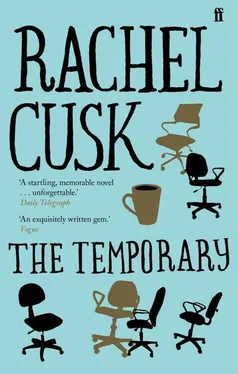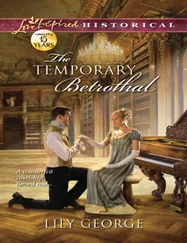Rachel Cusk - The Temporary
Здесь есть возможность читать онлайн «Rachel Cusk - The Temporary» весь текст электронной книги совершенно бесплатно (целиком полную версию без сокращений). В некоторых случаях можно слушать аудио, скачать через торрент в формате fb2 и присутствует краткое содержание. Год выпуска: 2013, Издательство: Faber & Faber, Жанр: Современная проза, на английском языке. Описание произведения, (предисловие) а так же отзывы посетителей доступны на портале библиотеки ЛибКат.
- Название:The Temporary
- Автор:
- Издательство:Faber & Faber
- Жанр:
- Год:2013
- ISBN:нет данных
- Рейтинг книги:5 / 5. Голосов: 1
-
Избранное:Добавить в избранное
- Отзывы:
-
Ваша оценка:
- 100
- 1
- 2
- 3
- 4
- 5
The Temporary: краткое содержание, описание и аннотация
Предлагаем к чтению аннотацию, описание, краткое содержание или предисловие (зависит от того, что написал сам автор книги «The Temporary»). Если вы не нашли необходимую информацию о книге — напишите в комментариях, мы постараемся отыскать её.
The Temporary — читать онлайн бесплатно полную книгу (весь текст) целиком
Ниже представлен текст книги, разбитый по страницам. Система сохранения места последней прочитанной страницы, позволяет с удобством читать онлайн бесплатно книгу «The Temporary», без необходимости каждый раз заново искать на чём Вы остановились. Поставьте закладку, и сможете в любой момент перейти на страницу, на которой закончили чтение.
Интервал:
Закладка:
The sun was bright but weak and gave the day a deceptive appearance, casting a patina of warmth which did not convert the essential coolness of the air. The naked trees lining the road strained towards the light, greedy for its faint catalyst to burst them prematurely into bloom. It was spring, Ralph supposed, that long and amorphous season into which winter would occasionally recover and summer remit like a lingering low-level illness, never quite gripping at the throat with certitude. He groped for a date and remembered then that it was still only February. The year stretched before him in all its unavoidable detail, the hundreds of days and thousands of hours which he would endure as if something more lay at their end than mere repetition. He wished that he could be tricked, as others seemed to be, by the close of each week, seeing in their false endings the imminence of some sort of conclusion, like a soap opera. He wondered why he had never fallen into step with this pattern of days, comprehended in the helpful clarity of a week’s tiny eras — birth, growth, productivity, decline, dormancy, regeneration, played out beneath the celestial presence of longer phases of weather — a system which might ease the slow construction of his life. The year he had spent alone with his father, a chaotic tract across which no borders of time or habit were erected, had become in its elasticity the infinitely capacious repository of Ralph’s failings and he placed this latest grudge firmly within it. How could he, who had spent the most formative year of his youth, the year in which he was most pliant, most liable to gel in whichever crazy mould was nearest to hand, had spent that year ‘on the road’, a hostage to his father’s misfortune; how could he, then, be expected to see things as other people did?
He fed himself from the tributary of his street into the main concourse drifting towards the lock, and in the suddenly thick press of bodies felt his exposure ease as they gathered him in. He had had days like this before, days when his spirits would gutter or flare at each movement of life, when he wrestled hourly with his recollections, at once their victim and their hero. It was good that he was out, although even here in the open air his father’s eyes were on him, shrivelled with whisky and immolated desire. He felt their reproach, as he always did when shrugging off portions of himself into the complaining vacuum of his absence. The problem was that it wasn’t a vacuum at all. He was merely relocating things he disliked about himself, slapping up hasty walls around them, building twisted, ridiculous corridors, papering over their leaks. He had complicated himself with introspection. He felt a longing to demolish it all and start again. His father had been a master of evasion, blockading all routes to the past, bricking up vistas of the future, until all that was left of him was a tiny room in which a man sat in an armchair watching television. He had once been a boy scout, though; the only photograph Ralph possessed of his father depicted him at the acme of his scouting career, when he had risen from amongst the ranks to become their general. He wore a cap and cravat, and stared out beyond the lens with triumphant eyes as if towards vanquished hordes. Later, his mind would travel back to that glittering epoch and he would endeavour gently to tell Ralph of it, in a hotel room where rivers of Terylene cascaded from the mouths of his suitcases and the air was warm with the rank perfume of their take-away dinner.
‘Dad, I’m reading,’ Ralph would implore, raising his book by the covers as if to shield him from the eye-watering woodsmoke of his father’s recollections.
‘Ah, yes,’ his father would confirm, nodding. ‘But a boy your age shouldn’t have to turn to books for company. He should be outdoors with other boys engaging in some form of organized activity.’ He would sigh and put his arms behind his head, like a man on holiday. ‘What do you say we play a hand of whist?’
‘Dad, I’m reading .’
Once Ralph witnessed his father getting into a fight — or failing to get out of it, in any case — in a pub in Worthington where they had gone one evening for pie and chips and where Ralph was permitted to drink his lemonade from a pint glass identical to that from which his father sipped beer with womanly daintiness. Ralph had deliberately left the translucent spume on his lip while his father wiped his own away, watching him closely as he ate and drank.
‘Is it good?’ he said after each mouthful. Ralph nodded. ‘Never leave a moustache,’ he counselled, handing Ralph a paper napkin. ‘A gentleman never leaves a moustache.’
Already his father had begun to deliver his epithets in the defensive manner with which he touted Terylene, at once sheepish and proud.
‘A gentleman,’ he repeated, ‘never has a sloppy lip.’
It was shortly afterwards that he saw his father, gone to the bar to refill their glasses, borne away from his view in a sudden clutch of strangers and swept out through the double doors of the pub beyond into the street, his bald pate bobbing as if suspended in water. Ralph had thought to follow him out, but the barmaid had come to the table with his second pint glass of lemonade and had instructed him kindly to drink it. He had done so while she watched, drinking it all down in one go as he had seen other men do until she had laughed and told him he’d burst if he carried on like that; and what with all the excitement he had quite forgotten about his father until he emerged back through the doors with his shirt hanging out and his cheeks flushed dark red in a grotesque approximation of youth and vitality.
‘A word of advice, Ralphie,’ he had said, sitting down heavily beside him. His belly heaved in and out frantically. ‘Never show your wallet at the bar. Temptation, you see. The smart fellow always takes out a single note in advance.’
Ralph asked him if you could make yourself burst by drinking too much all in one go.
‘Well, let’s see,’ said his father after a pause, furrowing his brow and screwing up his eyes intently. His upper lip glistened with sweat. He shook his head. ‘I don’t think it’s likely. No, I don’t think it’s likely at all.’
Ralph would read in the evenings, devouring the pages of library books while his father dozed before the television with a hotel tooth-mug filled with whisky. Sometimes the empty glass would slip from his hand and he would wake with a start as it thumped to the floor.
‘Must have dozed off,’ he would apologize, rubbing his eyes and smiling crookedly. ‘Good book, Ralphie?’
‘Quite good.’
‘Ah, I see. What’s the plot?’
He crossed the lock and plunged into a sea of stalls, through crowds whose lumpy shopping bags thumped against his calves, past Indian men selling garish explosions of clothing and girls with dead eyes and chalky faces around which shreds of hair hung like seaweed. He headed down towards the fruit market, craving the perishability of its offerings. When he reached it the market was noisy, a field of combat where red-faced stallholders shouted like disgruntled babies while produce which seemed overly bright was fondled by people who evidently weren’t.
‘Can’t you read?’ roared one of them, as a woman in a grubby knitted hat ran her fingers over a hill of oranges, touching them delicately like a blind person. She started at the sound of his voice, her eyes wide. ‘What does that say?’ persisted the stallholder. He pointed to a sign perched on the display, on which was depicted a large pair of melons with the warning ‘Please Don’t Squeeze’ emblazoned beneath them. The woman removed her hands from the oranges and left them to hang inertly by her sides.
Ralph moved away quickly. Squashed fruit and bruised bits of vegetable lay trampled on the pavement, strangely ghoulish and unidentifiable, like the detritus of a serious operation. His foot slid on something pulpy and yielding, squelching beneath his shoe and oozing out around the sole. He limped along a few paces despairingly, trying to scrape it off against the kerb. It came away in smears, and by the time he managed to get rid of it he saw that he had spread it over rather a large patch of concrete. He looked around, embarrassed, and then walked awkwardly on as if nothing had happened. Moments later, recognizing the foolishness of his growing discomfort, he stopped at another stall and bought a bag of apples. The bag was made of brown paper and he had to hold it underneath to prevent it from giving way. He moved on, encumbered, through the nervous sunlight. As he approached the end of the small street he saw a well-dressed oriental girl bending over a large rubbish bin as if she had dropped something in it which she wanted to retrieve. She was exceptionally graceful, Ralph thought, fragile and luminous in that way Eastern girls were. People were looking at her as they passed. For a moment he thought ridiculously of offering to help her, but as he drew near he saw to his horror that the girl was clutching her belly with one hand and holding the other to her chest, while neatly depositing long ribbons of mucus and vomit into the bin. Her narrow shoulders shook slightly beneath her tailored jacket. He hesitated as a double wrench of pity and selfishness twisted in his chest. The girl would be grateful for kindness, he knew — she was alone, after all, sick and far from home! — but as he stood there the scope of the city seemed to unfold and chide him, bidding him to keep to himself, to go about his business in its common parts, its streets thick with souls, and then return directly to what was his, to what he knew. He permitted himself to walk past her. Later, walking back in the direction of the lock, he imagined himself stopping to help the girl, his arm strong around her convulsing shoulders, a handkerchief produced to smooth over her glistening lips. She leaned weakly against him, her eyes filled with tears and gratitude. He strained guiltily to return to her, but his legs carried him stubbornly on.
Читать дальшеИнтервал:
Закладка:
Похожие книги на «The Temporary»
Представляем Вашему вниманию похожие книги на «The Temporary» списком для выбора. Мы отобрали схожую по названию и смыслу литературу в надежде предоставить читателям больше вариантов отыскать новые, интересные, ещё непрочитанные произведения.
Обсуждение, отзывы о книге «The Temporary» и просто собственные мнения читателей. Оставьте ваши комментарии, напишите, что Вы думаете о произведении, его смысле или главных героях. Укажите что конкретно понравилось, а что нет, и почему Вы так считаете.












